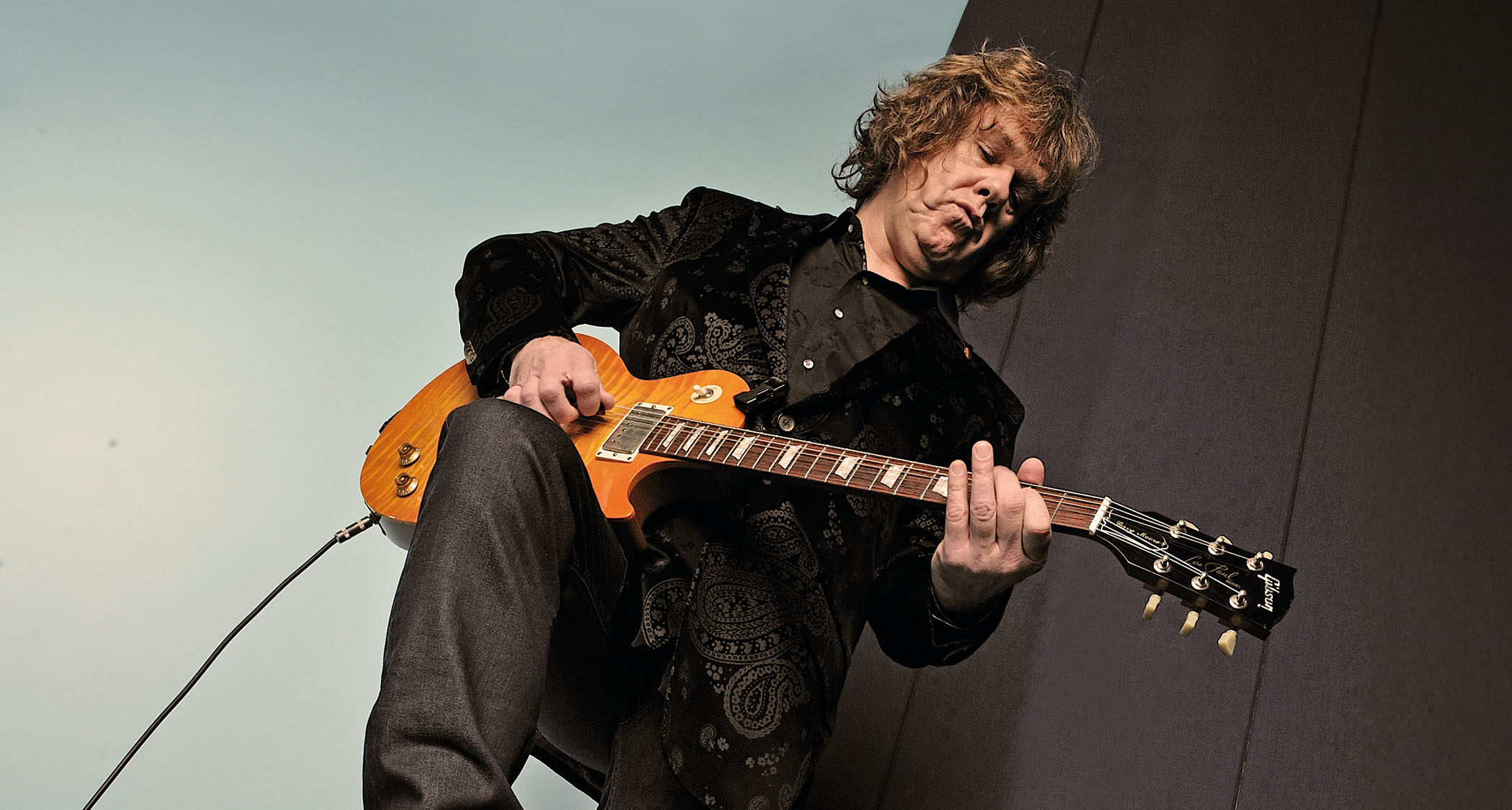Guthrie Govan shares the story behind his latest signature Charvel
If there is such a thing as an all-purposes guitar, then Guthrie Govan's latest signature Charvel San Dimas is it. Here, Govan talks through the design choices behind the high-performance electric

All the latest guitar news, interviews, lessons, reviews, deals and more, direct to your inbox!
You are now subscribed
Your newsletter sign-up was successful
Guthrie Govan is a busy man. But he was good enough to take some time out of his touring schedule with the Hollywood composer Hans Zimmer to discuss an electric guitar close to our hearts – his signature Charvel MJ San Dimas SD24 CM.
His latest signature guitar is a classy, practical and quietly spectacular all-purposes electric that is built for all kinds of styles – metal guitar, rock guitar, fusion, jazz... Blues if you have the discipline to not let its buttery feel run away with you.
As our review put it, it is “a souped-up and pimped version of what once may have been a Stratocaster.” Here, Govan walks through some of its key features, and explains why the MIJ model had shortcuts in replicating the feel and performance and sound of its US counterpart.
To set the record straight, we believe your first Charvel signature actually dates back to 2014. We previously looked at the two-piece, centred-joined ‘caramelised’ ash version around four and a half years ago, so this new MJ model is signature number….?
“A good question, and one which I had never considered before! I suppose the original 2014 model was the ‘Mk 1’ and then the ‘Mk 2’ version emerged several years later, incorporating additional innovations – such as the little switch to engage the single-coil emulation in each humbucker – and also offering two different body wood ‘flavours’.
“This latest MJ interpretation of the design is intended to complement the previous versions rather than to supersede them, so to call it the ‘Mk 3’ might be slightly misleading, but technically I guess it would nonetheless be accurate.”
Currently, along with the new MJ model, there’s the ‘caramelised’ ash and the basswood/flame maple signatures – both USA-made. The new model uses a bit of both: basswood body with an ash veneer top. How do the different body wood combinations affect the character of the guitar?
All the latest guitar news, interviews, lessons, reviews, deals and more, direct to your inbox!
“Tonally, I’d say that the new model sounds closer to the basswood/maple version. The ash top doubtless contributes a little extra ‘shimmer’ to the tone, but mostly I’m hearing basswood characteristics in the MJ guitar. It’s pretty much neutral across all the frequencies, so it’s a good all-rounder.”
I was keen to retain as many of the original US features as possible, so the functionality and quality of the guitar wouldn’t be compromised
Aside from the body wood change (and where it’s made and the lower cost), were there any other tweaks to the new model?
“We actually discovered a couple of subtle ways to improve on the original design by incorporating some strategically placed foam [more on this later…], but in more general terms I was keen to retain as many of the original US features as possible, so the functionality and quality of the guitar wouldn’t be compromised in any way.
“I think of this guitar simply as a new member of the GG signature family, rather than as a ‘budget’ version. To illustrate this, I may as well add that I’m currently out on the road with Hans Zimmer, and the MJ prototype actually turned out to be my No 1 guitar for the bulk of the set.”

Aside from the stability that the graphite neck reinforcement brings, in your experience does it have any effect on the sound, and/or response of the guitar?
“Well, everything affects the tone of an instrument, so I’m sure the graphite is contributing something, perhaps a little extra ‘tightness’? In all honesty, though, it’s hard for me to describe exactly what the tonal difference might be because we never actually experimented with a non-graphite alternative during the initial development phase.
“Based on years of touring experience, I was just determined to go with the most stable possible option for the neck construction for this model, so I never really contemplated ruling out the graphite reinforcement.”
I wanted the pickups to be hot enough to drive a relatively ‘vintage’ amp convincingly, while avoiding the loss of clarity and character that can result from making a pickup excessively hot
What about the pickups – have there been any changes since 2014?
“No, they’re the same. I believe the pickups on the MJ guitar are actually made in Korea, but the design is identical. When I received the MJ prototype, I didn’t notice any difference in the sound of the pickups and was genuinely surprised to learn that they had been manufactured elsewhere.”
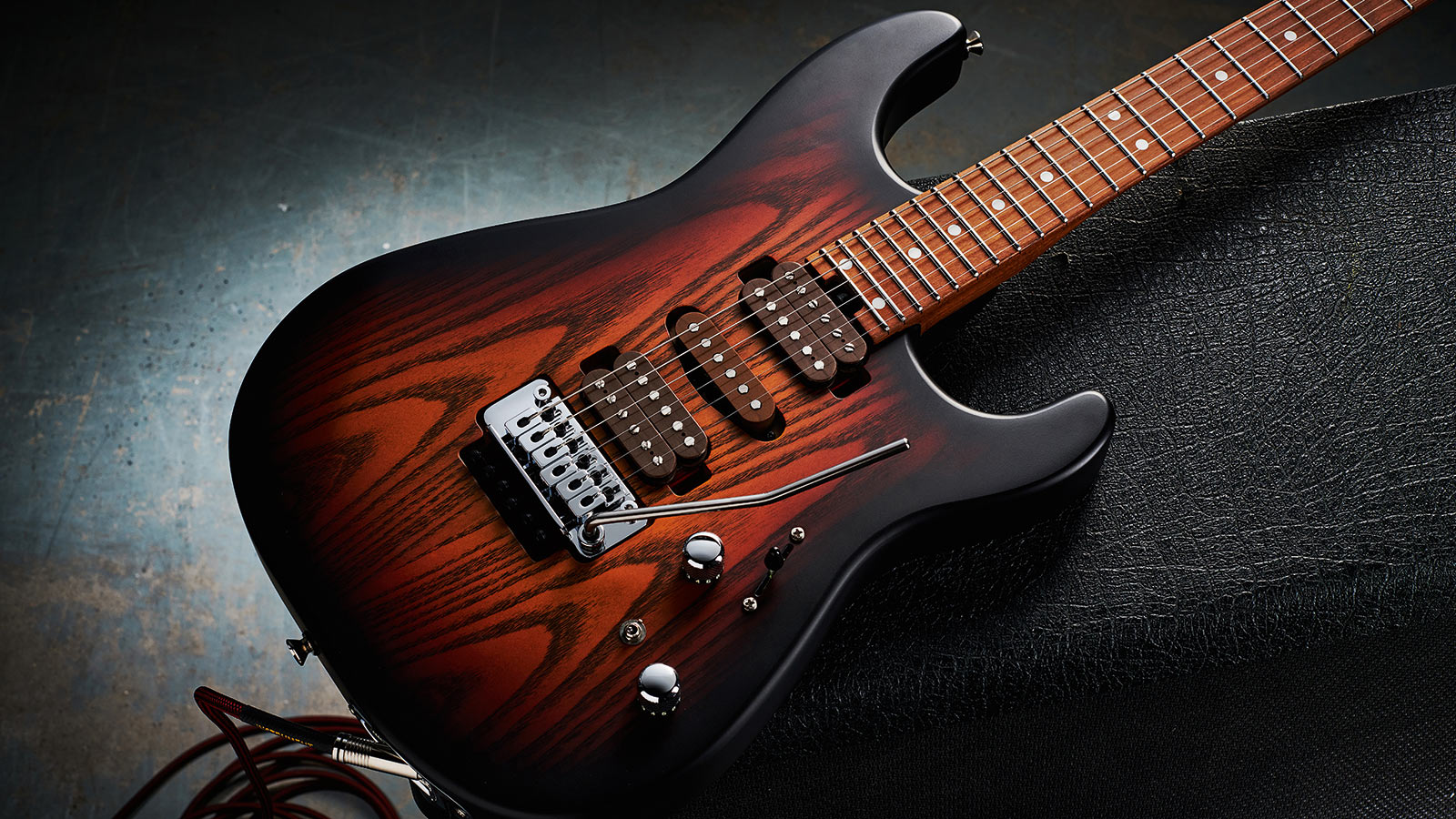
When you were originally voicing the guitar, did you refer to any favourite pickup in particular?
“Not really. Michael Frank-Braun designed those pickups from scratch and our communications during the development process mostly focused on what we wanted the pickups to do in terms of retaining dynamic response and maximising their sensitivity to different playing techniques.
“In terms of output, I wanted the pickups to be hot enough to drive a relatively ‘vintage’ amp convincingly, while avoiding the loss of clarity and character that can result from making a pickup excessively hot.
“It was really helpful that Michael seemed to understand the requirements of my particular playing style and he had some pretty accurate instincts about what I was looking for.”
In your guitar’s promo video you talk about foam, as you mentioned a little earlier. Tell us more about that.
“We found two useful ways to incorporate foam into this design. Firstly, there’s some foam in the vibrato cavity to prevent the springs from ringing out sympathetically – which really helps to clean up the gaps when you’re playing staccato rhythms with a highly overdriven amp setting.
“Secondly, there’s some additional magic foam behind the bridge pickup. The basic design of the GG guitars features pickups with a fixed height, so they’re bolted down to the body wood. I think there are certain tonal benefits to doing things this way and I personally like the ‘factory setup’ balance between all the pickups, with the bridge humbucker a little hotter than all the other settings.
“But I realised that some players might prefer a little more consistency between the levels of each humbucker, so having that foam behind the bridge pickup keeps it stable while allowing for subtle height adjustments.
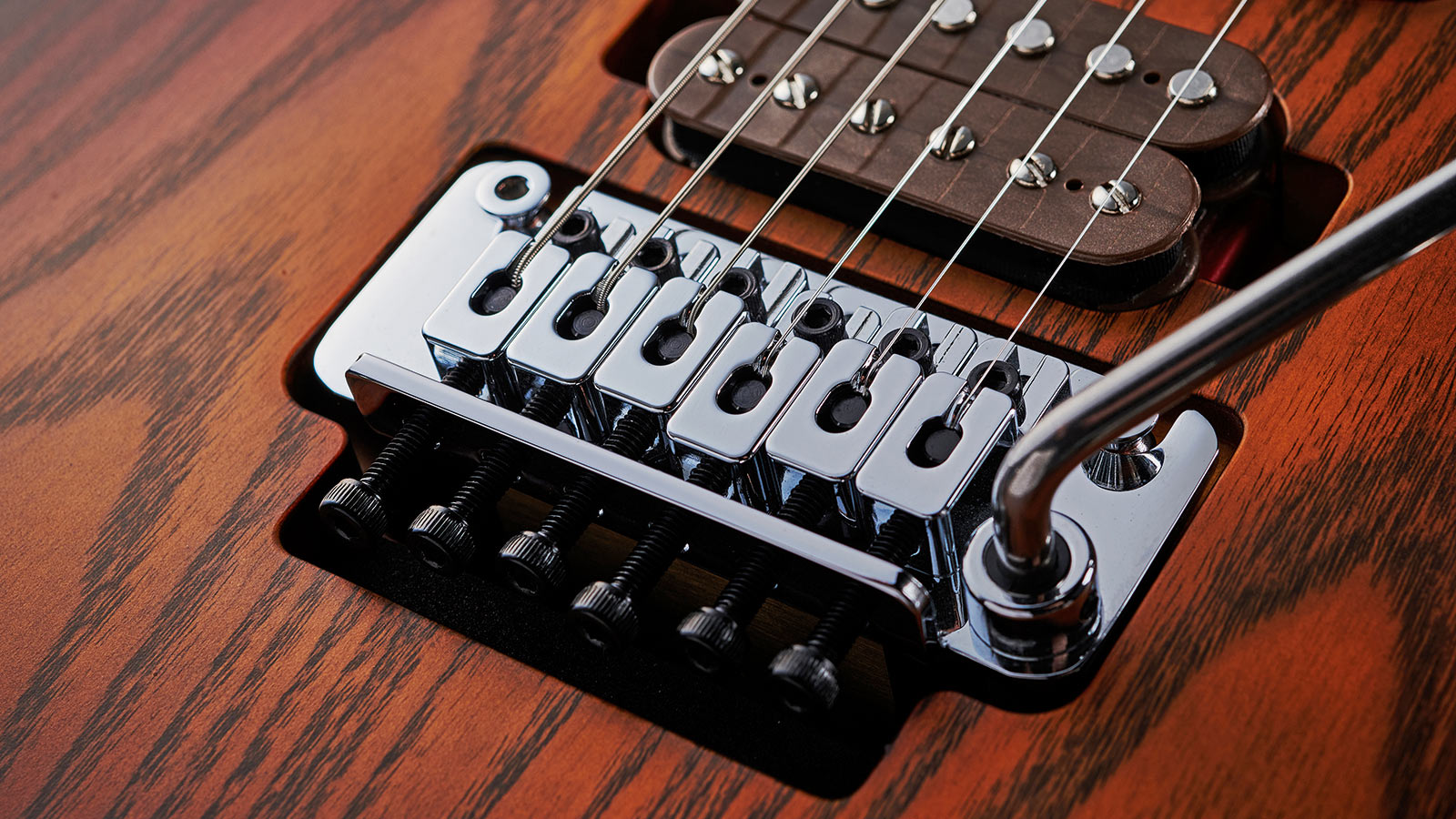
“The inspiration for this tweak actually came when I was playing around with a [Universal Audio] UAD Apollo interface and realised that the bridge humbucker seemed just that little bit too keen to push the signal into the red – a definite no-no when recording digitally.”
There’s no Tremol-No fitted to the new model. Why is that?
“We wanted to retain as many of the cool US features as possible, but we were also keen to make this guitar more affordable without compromising any aspect of its quality – and the Tremol-No seemed like the one feature that could reasonably be removed on the grounds that, firstly, not every player would feel the need for such a device and, secondly, it would be easy enough to install one yourself if you felt the need for it.”
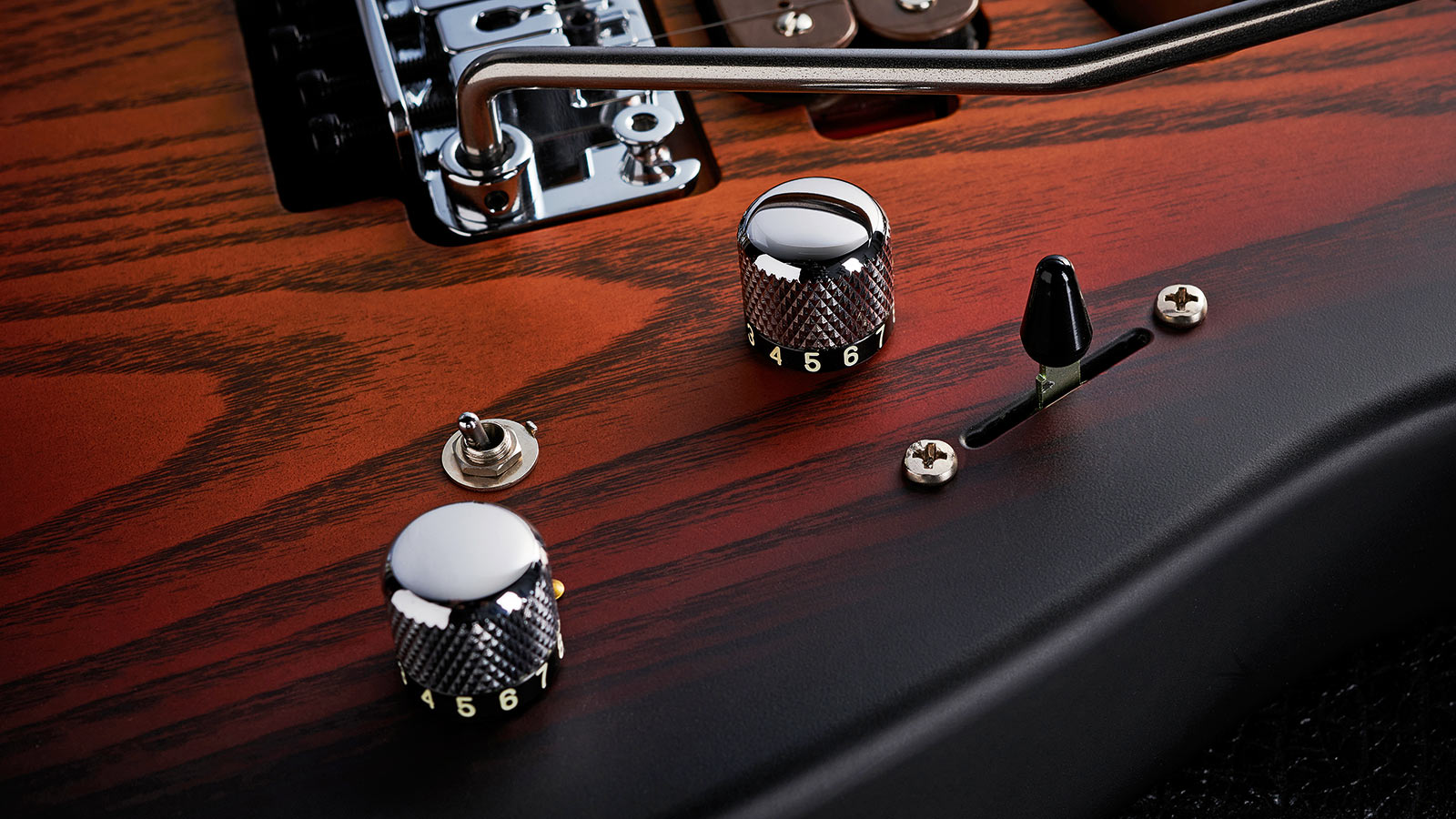
Most HSH guitars offer some kind of single-coil splits. You use the simulation, which is still hum-cancelling. Have you previously had problems with single-coil hum? How important to you is it that all the sounds are as hum-free as possible?
“For me, it’s pretty important, at least for touring applications, where I frequently encounter unpredictable electrical supplies and such like. In those situations it’s comforting to know that none of my pickup settings will add to the unavoidable issues of in-house buzz and interference.
“Incidentally, the other thing I really like about the single-coil simulation is that the output level pretty much matches that of the full humbucker setting, so you can enjoy a recognisably single-coil EQ character while still driving the amp hard.”
Do you have to do any maintenance on the road? We suspect you might be quite handy with a nut file! Do you have any general tips for anyone trying to keep a non-locking vibrato in tune?
“I very rarely need to do any kind of mid-tour surgery on these guitars – they were very much designed with reliability in mind so, generally, everything just works.
“In terms of maximising tuning stability without resorting to the use of a locking nut, some of that is ‘baked’ into the design of the guitar; the nut slots are well cut and the staggered height tuners ensure that the strings bend no more than is strictly necessary as they pass over the nut.
“In more general terms, I’m a big fan of using some kind of nut lubricant to reduce friction. Big Bends Nut Sauce always does the trick for me, but a couple of wise guitar techs have informed me that you can approximate at least some of those benefits with a humbler product such as a ChapStick!”
Finally, why was Charvel the right partner to create your signature guitars?
“When Charvel initially approached me, it became clear that they were genuinely interested in what I needed from a guitar and that they were willing to invest a lot of their time, energy and expertise into designing something that truly took all of my input into account. We spent a good couple of years refining the design, so these guitars really do feel like the result of a true collaborative effort.”
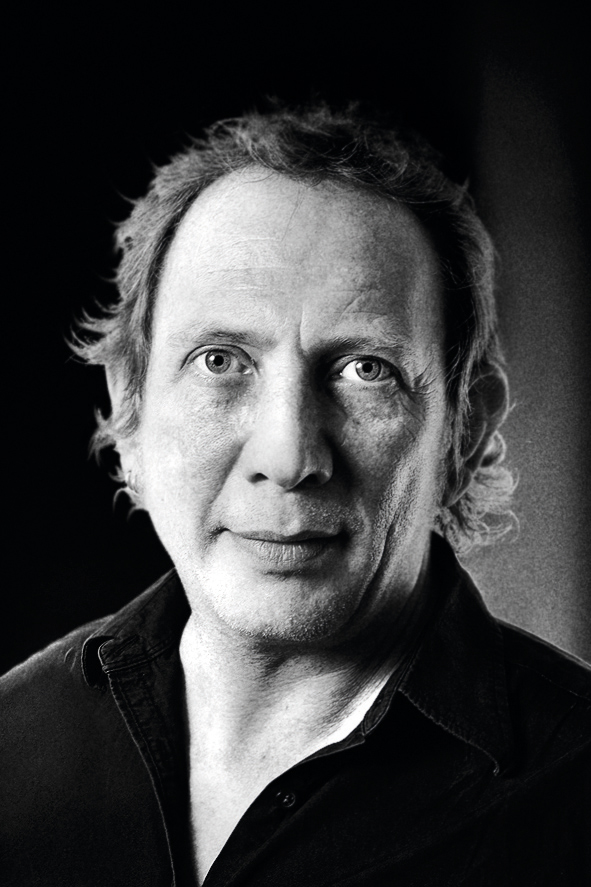
Dave Burrluck is one of the world’s most experienced guitar journalists, who started writing back in the '80s for International Musician and Recording World, co-founded The Guitar Magazine and has been the Gear Reviews Editor of Guitarist magazine for the past two decades. Along the way, Dave has been the sole author of The PRS Guitar Book and The Player's Guide to Guitar Maintenance as well as contributing to numerous other books on the electric guitar. Dave is an active gigging and recording musician and still finds time to make, repair and mod guitars, not least for Guitarist’s The Mod Squad.
